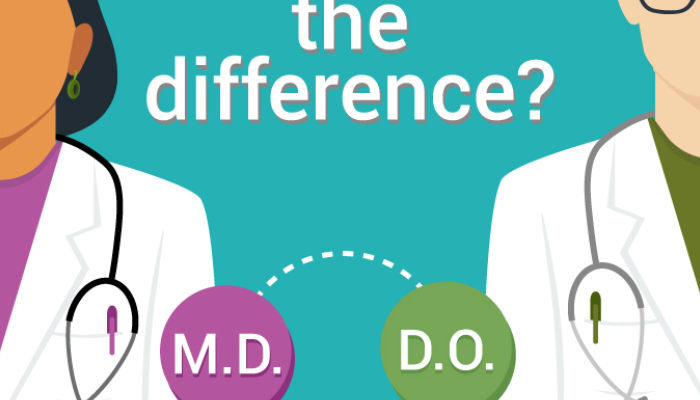

MD vs DO – what’s better?
When most people think of a ‘doctor’, they usually expect to see an ‘MD’ behind the name but since the mid-nineteenth century, the United States has also had another group of medical professionals practice medicine under the ‘DO’ designation. So which one is better?
We’re writing this blog in the context of understanding the landscape of the Caribbean medical schools, all of which offer the ‘MD’ (Doctorate of Medicine) degree. However, in the USA, having either the MD or DO will still allow you the rights and privileges of practicing western medicine, seeing patients and performing surgeries. But to understand both these fields of medicine, it makes sense to understand them individually, so let’s do that.
Starting with the ‘DO’ or Degree of Osteopathic Medicine, this practice of medicine came into existence about 90 years after the conventional MD-granting schools were forged in the USA. Ironically, the American School of Osteopathy was created almost out of resistance in the fundamental practices and beliefs that the conventional school of medicine had. DO schools trains their students to have a more holistic approach to medicine, considering a patient’s environment, nutrition, and body system as a whole when diagnosing and treating medical conditions. Ironically, in today’s era of medicine, even MD schools teach their students to think of the patient as a whole and not just as a singular disease. For the longest time, both schools of thought restrained from intermingling with one another but we’re not here to talk about the ‘politics’ of it all – at the end of the day, we’re curious to know whether the practice of medicine from both these schools work to better the livelihood, health and quality of patients!
Within the school of Osteopathic medicine, their overriding philosophy is the premise of healing the body through osteopathic musculoskeletal manipulation, whereas MD schools (or allopathic medicine) dealt more with evidence-based practices. DO schools have therefore been known to lack scientific and clinical research as part of their curriculum (although in more recent years, that has started to change). As far as actual content being learnt, the coursework at MD and DO schools is similar, with the most notable exception being that DO students are taught osteopathic manipulative medicine. Some would say that it’s much easier to get into a DO school in the USA than a conventional MD school. In the US, there are roughly 34 DO schools, versus the over 140 MD schools but both schools can produce fully licensed medical doctors that have full medical practice rights throughout the USA.
So what about MD schools then? Well, of the 140 or so schools throughout the US, only 9% of those that apply get accepted (versus the 46% that apply to DO schools). Allopathic medicine has been historically more recognized for its pedigree, education, training and evidence-based practices (built of years and years of research). When you think of a neurosurgeon, generally you’re expecting an MD after their name but in today’s America, they can equally have a DO degree too. In fact, although DO students have their own licensing exams (the COMLEX), they can sit for the USMLEs too if they want to compete and train in allopathic residency training programs in the USA. It’s not the same for MD schools. Because of this, many argue that the DOs are taking spots from the MDs but that’s the beauty of the USMLEs – it’s a standardized exam and it doesn’t judge anyone based on where they went
to school. This is why the Caribbean medical schools have been thriving for nearly 40 years. Who would’ve ever thought that an American who couldn’t get into any of the 100+ MD schools in the US, who chose to go to the Caribbean, to be given the opportunity to pursue their dream, would ultimately write the same USMLE exams that American medical students write, score higher and secure a residency position back in the US? Well it happens and in vast numbers. Ross University and St. George’s University (both in the Caribbean have been posting 600-800 residency matches each year for the last few years).
In the United States, 67.4% of active physicians are M.D.s vs. 7.3% which are D.O.s with the remaining 24.2% receiving their degree (most likely MD or MBBS) from a medical school outside the USA (e.g. the Caribbean)
So with the existence of DO schools, why then do students still choose to venture off into the Caribbean to chase the MD? The harsh reality is that the ‘MD’ still holds more weight and merit in society than the DO. I’d argue that it was more ‘prestigious’ even if it was obtained offshore. This is why Caribbean medical schools are thriving to this day, even when newer DO schools are being erected throughout the US.
Although both roads (MD and DO) lead to the same outcome (practicing medicine in the US), and most patients could care less about what their doctor’s title was or where they went to school for that matter. For most patients, as long as the physician standing in front of them is able and capable of helping them with their current health dilemma, that’s all that really matters. Of course, most students entering the profession will usually continue to choose the MD over DO.
So, I guess the next question would then be, “when is the first DO school going to open up in the Caribbean?”